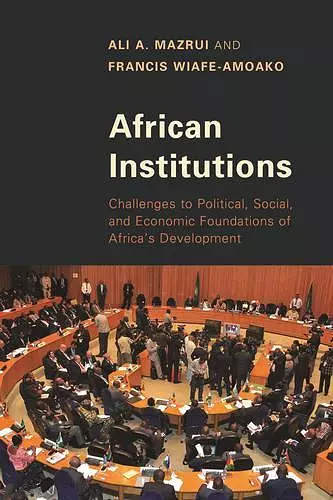African Institutions
Challenges to Political, Social, and Economic Foundations of Africa's Development
Ali A Mazrui author Francis Wiafe-Amoako author
Format:Paperback
Publisher:Bloomsbury Publishing PLC
Published:12th Nov '15
Currently unavailable, and unfortunately no date known when it will be back

Every political system, either developed or adopted, has an impact on the structure of society and the level of development. This book analyzes the evolution and nature of political institutions and their effect on Africa’s development. The challenges Africa face in developing viable institutions are not limited to the adoption of foreign institutions, but are also rooted in domestic norms that define society itself. Sometimes, these challenges have to do with the incompatibility between foreign and domestic institutions. The fundamental issue then is to understand the African societies, cultures, and other dynamics that have ensured stability in the past and that need to be recognized when adopting contemporary foreign institutions.
This comprehensive text examines three key issue areas in Africa: politics, society, and economy. It demonstrates how the lack of consideration for domestic norms and societal realities explain the weaker institutions and lack of development on the African continent. The chapters examine critical issues such as gender, ethnicity and constitution development, legitimacy and the state, the correlation between abundant resources and instability, the dilemmas of political dynasties, international economic regimes and Africa’s economy, and more. Featuring many case studies, including Kenya, South Africa, Senegal, Ghana, Nigeria, Tanzania, Morocco, Togo, DRC, Ethiopia, Rwanda, the book provides some explanation of underdevelopment in Africa, linking the historical and colonial realities that hinder democratic consolidation to contemporary African politics, society and economy.
The work by Ali Mazrui and Francis Wiafe-Amoako is an important contribution to our understanding of African institutions, in particular, and the study of institutions as a pivot around which societies hang together in general. . . .The book by Mazrui and Wife-Amoako provides an important frame of reference for understanding Africa’s future political paths and how the continent could play its role in the world. On the whole, the authors are hopeful about the prospects of democracy in Africa. Theirs is not banal hope characteristic of the mood swings in much of the analyses that one day see an Africa that is rising and the next see a hopeless continent. Their hope is grounded in analysis of trends over time, including the fact that military coups are receding, democratisation and economic progress are advancing in countries where institutions are solidifying and women are increasingly realising their political and economic roles in the continent. The analytical and argumentative manner in which the book is written makes it a fascinating and informative text on Africa’s institutions, their lack of maturity and the conditions that are necessary to ensure that they work optimally. * South African Journal of International Affairs *
In 2009 President Barack Obama said, rightly in my view, that Africa didn’t need strong men, it needed strong institutions. Professor Ali Mazrui made almost the same point in 1970 in an article aptly titled “The Monarchical Tendency in African Political Culture.” He also grappled with the associated challenges. Now Mazrui’s numerous writings on the subject conveniently re-appear as multiple chapters in African Institutions, ably updated by Dr. Francis Wiafe-Amoako, the book’s co-author. The book is further enriched with Wiafe-Amoako’s own chapters. This is a timely book and an invaluable reference, most ideal for comparative politics, African studies and related fields. -- Seifudein Adem Ph.D, associate director, Institute of Global Cultural Studies, State University of New York, Binghamton, New York
Much of what the younger partner to the late Mazrui wrote are contained in our celebrated Mazruian. Yet, it should be stated categorically here that Ali himself was sufficiently impressed by Francis Wiafe-Amoako to break bread with him in their lifetime journey to identify for posterity what must be done to cultivate institutions in modern Africa. In this age of Facebook, CNN, the BBC, and the VOA, the living voice of Mazrui and his colleague Francis will reverberate in the firmaments of African thoughts. -- Sulayman S. Nyang, professor and chairman of the African Studies Department, Howard University
ISBN: 9781442239531
Dimensions: 229mm x 151mm x 14mm
Weight: 304g
196 pages